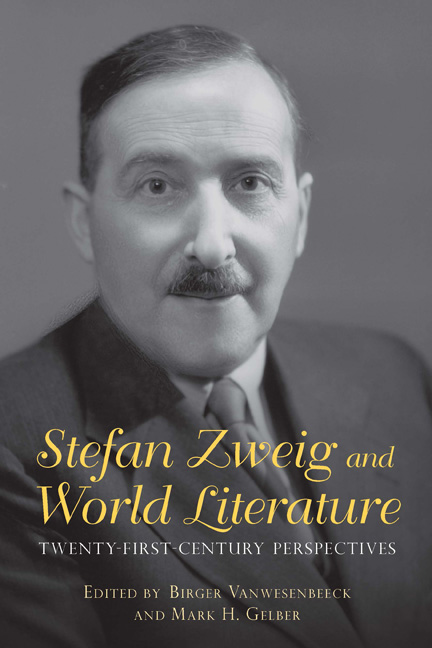Book contents
- Frontmatter
- Dedication
- Contents
- List of Illustrations
- Acknowledgments
- Introduction
- Part I Reception
- Part II Drama and Fiction
- Part III Criticism and Essays
- Part IV Politics and Exile
- 8 True to Himself: Stefan Zweig's Visit to Argentina in September 1936
- 9 Exile and Liminality in “A Land of the Future”: Charlotte and Stefan Zweig in Brazil, August 1941–March 1942
- 10 Stefan Zweig's Concept of Brazil in the Context of German-Jewish Emigration
- 11 Stefan Zweig: Life in Cities of Exile
- 12 The Writer's Political Obligations in Exile: The Case of Stefan Zweig
- Notes on the Contributors
- Index
11 - Stefan Zweig: Life in Cities of Exile
from Part IV - Politics and Exile
Published online by Cambridge University Press: 05 May 2015
- Frontmatter
- Dedication
- Contents
- List of Illustrations
- Acknowledgments
- Introduction
- Part I Reception
- Part II Drama and Fiction
- Part III Criticism and Essays
- Part IV Politics and Exile
- 8 True to Himself: Stefan Zweig's Visit to Argentina in September 1936
- 9 Exile and Liminality in “A Land of the Future”: Charlotte and Stefan Zweig in Brazil, August 1941–March 1942
- 10 Stefan Zweig's Concept of Brazil in the Context of German-Jewish Emigration
- 11 Stefan Zweig: Life in Cities of Exile
- 12 The Writer's Political Obligations in Exile: The Case of Stefan Zweig
- Notes on the Contributors
- Index
Summary
Last Years in Europe
“[A]lles hÄngt jetzt von der Neuen Welt ab” (from now on everything will depend upon the New World). Stefan Zweig wrote this line in mid-June 1940 to his friend, writer and translator Joseph Leftwich, who was living in London. Zweig wanted to explain to him why he had hesitated so long to leave England. He made it clear that he had now finally decided to make the journey to New York and from there go on to Latin America. He informed his friend that he hoped to be back in Great Britain by the end of October. But the farewell at Euston Station in London, where Lotte and Stefan were seen off by Hannah and Manfred Altmann and his friend Heinrich Eisemann, turned out to be a final farewell to Europe. In March he had written to the German writer Hermann Kesten that whoever left Europe now would never again return: “Hier können wir durch unsere bloße Anwesenheit eine Aufgabe erfüllen. Amerika würde uns verschlingen” (Here we can serve at least a purpose by simply being present. America would devour us).
Lotte and Stefan Zweig had found a new home in Bath, about 120 miles from Britain's capital. They resided there for less than a year. After leaving Salzburg in 1934, it was here where he allowed himself to feel at home again. Bath even seemed to have triggered certain memories of the view from Salzburg's Kapuzinerberg or of the Salzkammergut. Later, Stefan Zweig would use similar comparisons for the house in Petrópolis. “Bath ist bezaubernd, die reizendste Stadt, die ich in England kenne—ein Erszatz-Salzburg” (Bath is amazing, the most charming place I know in England—an Ersatz-Salzburg).” He now had a library at his disposal, even if it was only a tenth of the size of the library he had in his home in Salzburg. Thus, it was finally possible to carry on with his work, even though with the outbreak of war there was a permanent fear of a possible German invasion.
- Type
- Chapter
- Information
- Stefan Zweig and World LiteratureTwenty-First Century Perspectives, pp. 213 - 223Publisher: Boydell & BrewerPrint publication year: 2014



